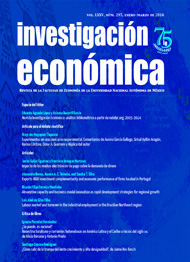LABOUR MARKET AND TURNOVER IN THE INDUSTRIAL EMPLOYMENT IN THE BRAZILIAN NORTHEAST REGION
Contenido principal del artículo
Resumen
Recent economic growth has played in settings marked labor relations, especially in scenarios of late capitalism. The disruption in the Brazilian labor market was the result of the offensive of capital over labor, in a context of economic growth with unemployment and high turnover rates. Therefore, this article aims to analyze the turnover of the industrial labor market in the Northeast. This scenario is strongly characterized by the national restructuring process, especially as a receiver of economic activity/work intensive. Methodologically, it resorts to a literature review and empirical methods are added to the construction of indicators of turnover. The time frame covers the years 2001 and 2010, with the data source to the Annual Social Information and the General Register of Employed and Unemployed of the Ministry of Labor and Employment. The main results show that there are high rates of unfair dismissal, and a high proportion of workers who leave their jobs in less than a year. In addition, turnover is more pronounced in construction and agriculture. However, when the selection is made for the sectors of manufacturing industry, mechanical industry, footwear and food industries have high rates of turnover, compared with the other. Regarding the turnover rate according to demographic and socioeconomic characteristics, it is more pronounced for the male labor force, the very young and the young, less educated and in jobs with earnings of up to one minimum wage.
Detalles del artículo
Cómo citar
da Silva Filho, L. A. (2016). LABOUR MARKET AND TURNOVER IN THE INDUSTRIAL EMPLOYMENT IN THE BRAZILIAN NORTHEAST REGION. Investigación Económica, 75(295), 203–230. https://doi.org/10.1016/j.inveco.2016.03.006
Los autores que publiquen en esta revista acceden a las siguientes condiciones:
a) Los autores retienen los derechos de copia (copyright) y ceden a la revista el derecho de primera publicación, con el trabajo asimismo bajo la licencia Creative Commons Attribution License que permite a terceros utilizar lo publicado siempre que hagan referencia al autor o autores del trabajo y a su publicación en esta revista.
b) Los autores son libres de realizar otros acuerdos contractuales para la distribución no exclusiva del artículo que publiquen en esta revista (como puede ser incluirlo en una colección institucional o publicarlo en un libro), siempre que indiquen claramente la publicación original del trabajo en esta revista.
